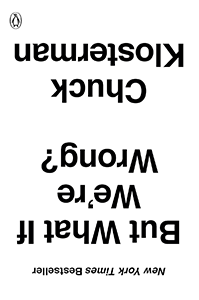But What If We’re Wrong?
“But What If We’re Wrong?: Thinking About the Present As If It Were the Past” is a thought-provoking book by Chuck Klosterman, a cultural critic and author known for his insightful commentary on contemporary issues. Here’s a summary of the key ideas from the book:
Central Thesis: Klosterman explores the concept of cultural and historical change by questioning our assumptions about what we consider to be true and significant in the present moment. He challenges readers to consider how our current beliefs and ideas might be viewed differently by future generations.
Predicting the Future: The book delves into the fallibility of predictions and forecasts, particularly in fields such as science, technology, culture, and politics. Klosterman argues that many widely accepted theories and ideas throughout history have proven to be wrong or incomplete over time.
Cultural Significance: Klosterman examines how cultural artifacts, such as books, movies, music, and art, are evaluated and interpreted differently as societal values and perspectives evolve. He questions whether our current cultural preferences and judgments will stand the test of time.
Alternative Histories: Klosterman explores the concept of alternative histories and counterfactual thinking. He asks readers to consider how different decisions, events, or outcomes could have shaped our present reality, challenging the idea that our current path was inevitable.
The Nature of Reality: The book encourages readers to question their understanding of reality and truth. Klosterman argues that what we perceive as objective reality is often influenced by subjective interpretations, biases, and cultural norms.
Cultural Amnesia: Klosterman discusses the phenomenon of cultural amnesia, where historical events, ideas, and figures are forgotten or misrepresented over time. He examines how certain narratives and interpretations become dominant while others fade into obscurity.
Reevaluation of Icons: Klosterman reevaluates cultural icons, such as musicians, writers, and historical figures, by considering how their legacies might be perceived differently in the future. He challenges readers to reconsider the significance and impact of these figures in light of changing societal values.
Philosophical Reflections: The book engages with philosophical questions about knowledge, certainty, and the nature of progress. Klosterman encourages readers to adopt a more skeptical and open-minded approach to understanding the world and its complexities.
Cultural Critique: Through cultural critique and analysis, Klosterman provokes readers to question their assumptions and biases about contemporary issues. He challenges prevailing narratives and encourages intellectual curiosity and critical thinking.
Implications for the Present: “But What If We’re Wrong?” ultimately invites readers to reflect on the limitations of their current understanding and encourages them to consider how future perspectives might reshape our understanding of the present.
Overall, Chuck Klosterman’s book offers a provocative exploration of how history, culture, and knowledge are constructed and reinterpreted over time. It challenges readers to think critically about the assumptions underlying their beliefs and to embrace uncertainty in the face of complex and evolving realities.

